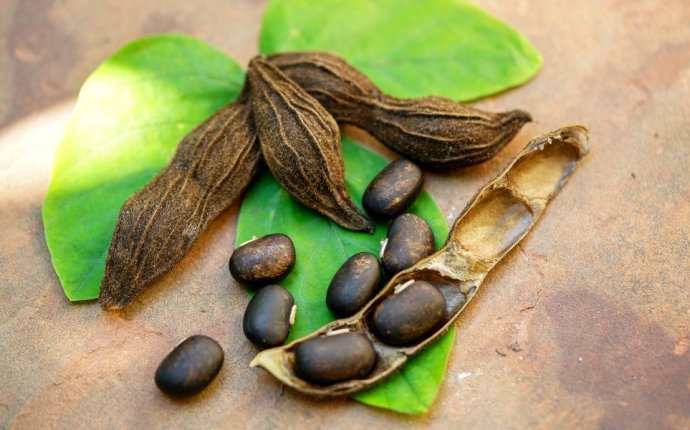
Mucuna Ayurveda
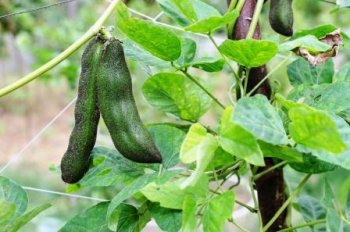 Kapikacchu – Mucuna pruriens is a very famous mutli-faceted herb of Ayurveda, with immense health benefits. Its usage is spread from aphrodisiac to neurological conditions. Its extract – L-dopa is widely used in the treatment of Parkinson’s disease.
Kapikacchu – Mucuna pruriens is a very famous mutli-faceted herb of Ayurveda, with immense health benefits. Its usage is spread from aphrodisiac to neurological conditions. Its extract – L-dopa is widely used in the treatment of Parkinson’s disease.
It is widely used in treating sexual and neurological disorders.
Botanical name: Mucuna pruriens Hook.
Family: Fabaceae
Hindi name: kaunch, Kevanch
English name: Cow-hage, Cow itch, Velvet beans
Kannada – Nasukunni
Malayalam – Naikorana
Tamil name – Poonai Kaali Vithu, poonaiKali Vithu, poonaiKali Vidai
Sanskrit Synonyms:
Kapikacchu – The pale brown bristles of fruit causes intense itching on skin contact
Guptapala, Svagupta, Atmagupta – Fruits are self protected by the bristles.
Markati – having bristles similar to monkey
Kandura – causes itching
Shukashimbi – the fruit shape resembles bird’s beak.
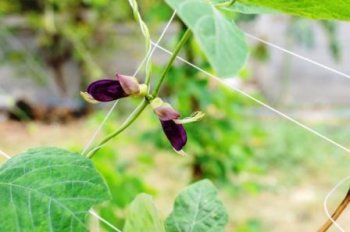 Classical categorization:
Classical categorization:
Charaka Samhita –
Balya – Tonic group of herbs
Madhuraskandha – Group of herbs with sweet taste
Sushruta Samhita
Vidarigandhadhi group of herbs
Vatasamshamana – Group of herbs that balance Vata.
Medicinal qualities:
Guna (qualities) – Guru (heavy to digest), Snigdha (unctuous, oilyness)
Rasa (taste) – Madhura – sweet, Tikta – Bitter
Vipaka – taste conversion after digestion
Veerya – Hot potency
Prabhava – Special effect – Vrushya – aphrodisiac
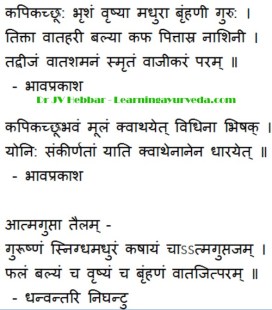 Effect on Tridosha – balances all the three Doshas
Effect on Tridosha – balances all the three Doshas
Mucuna pruriens benefits –
Vrushya – aphrodisiac
Bruhmani – Nutritive, nourishing
Guru (heavy to digest)
Vatahara – balances Vata – useful in neurological disorders
Pittasranashini – useful in bleeding diseases
Balya – improves strength and immunity
Bahumala – causes increased production of faeces, increases bulk of faeces
Vataghni – Useful in Vata related neurological disorders
Dushtavrananashini – useful in healing infected wounds with pus formation.
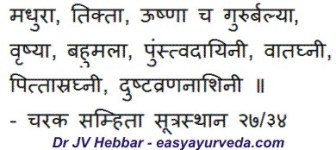 Seed is especially natural aphrodisiac and balances Vata.
Seed is especially natural aphrodisiac and balances Vata.
Its oil is heavy to digest, sweet and astringent.
Its root decoction causes uterine constriction on external application. It also induces menstruation, hence used in the treatment of amenorrheoa.
Parts used: Seed, root, pod hair.
Mucuna pruriens dosage:
Seed powder – Up to 6 – 10 grams per day for adults.
Seed Extract – 250 – 500 mg, once or twice a day after food.
Decoction – 5 – 15 ml, once or twice a day, in divided dose.
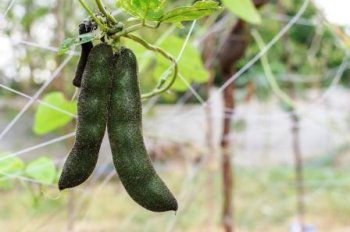 Side effects:
Side effects:
There are no definitive research made on side effects of Mucuna pruriens. But because the drug has aphrodisiac and neurological effects and because it has high amounts of L Dopa, this medicine should always be taken under strict medical supervision.
It is best to avoid this medicine during pregnancy and lactation. Children should be given this medicine only under strict medical supervision.
However, all the side effects of Levodopa can not be correlated with side effects of Mucuna pruriens. It is a natural herb with a healthy mix of phyto-chemicals and Levodopa is just one among them.
Ayurvedic medicines with Mucuna pruriens as ingredient:
Mushalyadi Churna – Used in PE, ED etc.
Manmath Ras, Iksuhradi Lehyam – Used in Aphrodisiac therapy
Mashabaladi kashaya – Used in neurological disorders such as Hemiplegia, facial palsy, Tinnitus etc.
Amritaprasha Ghrita – Used in burning sensation, fever, bleeding disorders, cough, asthma, weakness and gynaecological diseases.
Because of its use in increasing stamina, it is used as an ingredient in numerous bodybuilding supplements.














